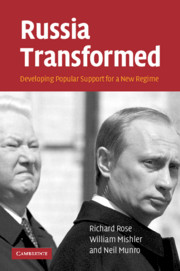Book contents
- Frontmatter
- Contents
- List of figures
- List of tables
- Acknowledgments
- Introduction Transformation and its aftermath
- 1 Time matters: the dynamics of regime support
- 2 The supply of regimes: democratic and autocratic
- 3 A changing supply of Russian regimes
- 4 Uncertainties of transformation: a view from the bottom
- 5 Changing levels of regime support
- 6 Social structure and the evaluation of regimes
- 7 The influence of political values and performance
- 8 Finding the economic influences that matter
- 9 The impact of the passage of time
- 10 What could challenge the new equilibrium?
- Appendix A New Russia Barometer samples
- Appendix B Coding of variables
- References
- Index
3 - A changing supply of Russian regimes
Published online by Cambridge University Press: 22 September 2009
- Frontmatter
- Contents
- List of figures
- List of tables
- Acknowledgments
- Introduction Transformation and its aftermath
- 1 Time matters: the dynamics of regime support
- 2 The supply of regimes: democratic and autocratic
- 3 A changing supply of Russian regimes
- 4 Uncertainties of transformation: a view from the bottom
- 5 Changing levels of regime support
- 6 Social structure and the evaluation of regimes
- 7 The influence of political values and performance
- 8 Finding the economic influences that matter
- 9 The impact of the passage of time
- 10 What could challenge the new equilibrium?
- Appendix A New Russia Barometer samples
- Appendix B Coding of variables
- References
- Index
Summary
Although the past has been overthrown, it has not been overcome.
V. I. Lenin, 1923Merely experimenting with abstract models and schemes taken from foreign textbooks cannot assure that our country will achieve genuine renewal without any excessive costs. The mechanical copying of other nations' experience will not guarantee success either.
Vladimir Putin, millennium address, 2000While the regimes supplied by the tsars and by the Communist Party of the Soviet Union differed radically in their goals, both were outside the mainstream of European political development. Thus, Vladimir Putin was correct in emphasizing that what is viewed as normalno by the country's political elites is not what is normal in democratic regimes of Europe or in the United States.
Under the influence of Mongol invaders and Byzantine civilization, the tsarist regime originated as a despotic autocracy resembling an Asian empire rather than a European feudal state (Hosking, 2001: chapter 1). The nineteenth-century industrialization of Europe produced a reaction from Slavophile writers, who stressed Russia's uniqueness.Western travelers saw Russia as alien to Europe too (see Wolff, 1994; Hedlund, 1999: chapter 4). While European regimes came and went, the Russian tsars successfully maintained their regime through cycles of steady-state and dynamic equilibrium for more than three centuries before being overthrown in 1917.
Although Lenin was familiar at first hand with European constitutional autocracies and democracies, the Soviet Union was founded as a challenge to European regimes.
- Type
- Chapter
- Information
- Russia TransformedDeveloping Popular Support for a New Regime, pp. 49 - 68Publisher: Cambridge University PressPrint publication year: 2006



